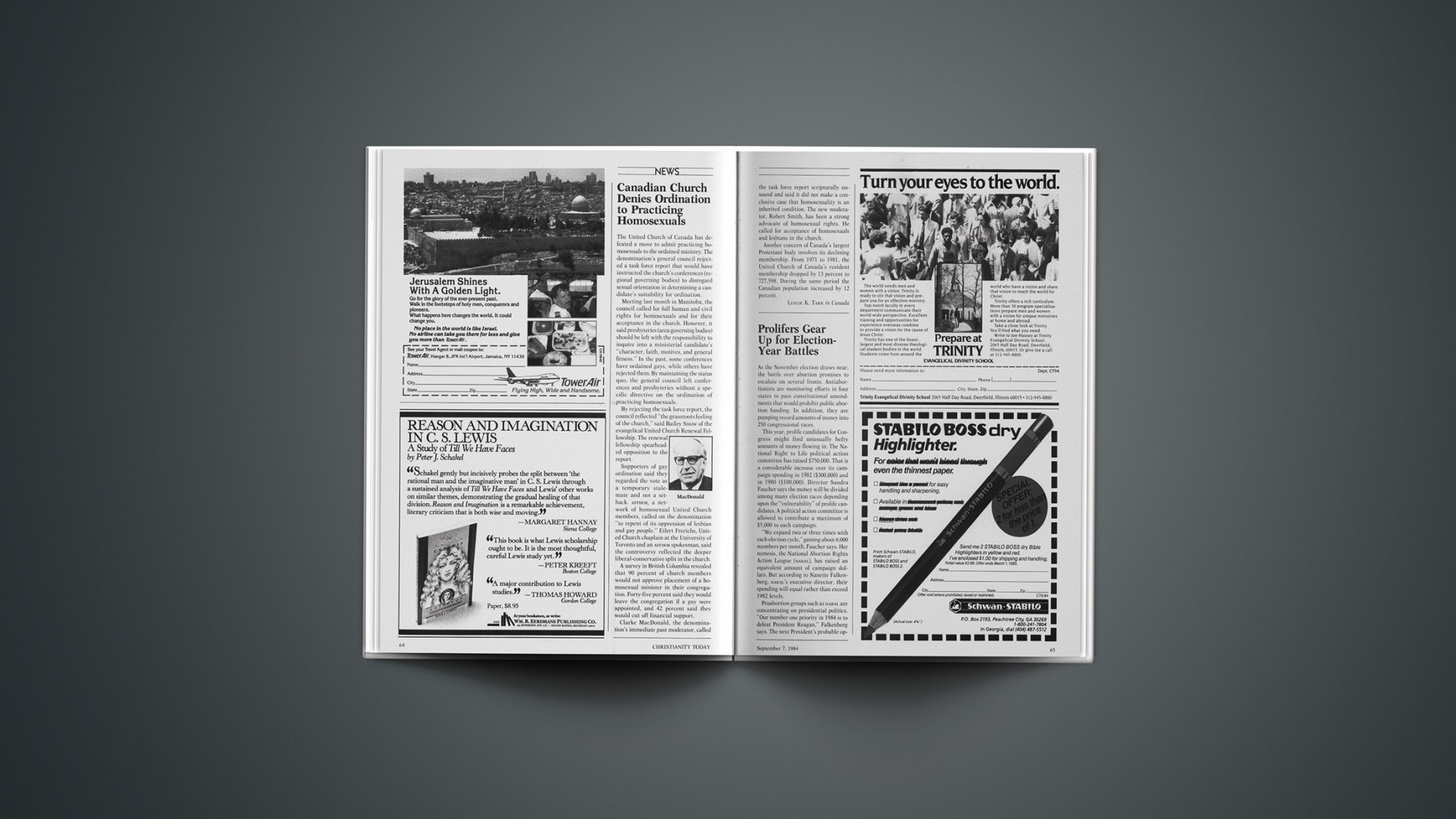The United Church of Canada has defeated a move to admit practicing homosexuals to the ordained ministry. The denomination’s general council rejected a task force report that would have instructed the church’s conferences (regional governing bodies) to disregard sexual orientation in determining a candidate’s suitability for ordination.
Meeting last month in Manitoba, the council called for full human and civil rights for homosexuals and for their acceptance in the church. However, it said presbyteries (area governing bodies) should be left with the responsibility to inquire into a ministerial candidate’s “character, faith, motives, and general fitness.” In the past, some conferences have ordained gays, while others have rejected them. By maintaining the status quo, the general council left conferences and presbyteries without a specific directive on the ordination of practicing homosexuals.
By rejecting the task force report, the council reflected “the grassroots feeling of the church,” said Bailey Snow of the evangelical United Church Renewal Fellowship. The renewal fellowship spearheaded opposition to the report.
Supporters of gay ordination said they regarded the vote as a temporary stalemate and not a setback. AFFIRM, a network of homosexual United Church members, called on the denomination “to repent of its oppression of lesbian and gay people.” Eilert Frerichs, United Church chaplain at the University of Toronto and an AFFIRM spokesman, said the controversy reflected the deeper liberal-conservative split in the church.
A survey in British Columbia revealed that 90 percent of church members would not approve placement of a homosexual minister in their congregation. Forty-five percent said they would leave the congregation if a gay were appointed, and 42 percent said they would cut off financial support.
Clarke MacDonald, the denomination’s immediate past moderator, called the task force report scripturally unsound and said it did not make a conclusive case that homosexuality is an inherited condition. The new moderator, Robert Smith, has been a strong advocate of homosexual rights. He called for acceptance of homosexuals and lesbians in the church.
Another concern of Canada’s largest Protestant body involves its declining membership. From 1971 to 1981, the United Church of Canada’s resident membership dropped by 13 percent to 727,598. During the same period the Canadian population increased by 12 percent.
LESLIE K. TARRin Canada
Prolifers Gear Up For Election-Year Battles
As the November election draws near, the battle over abortion promises to escalate on several fronts. Antiabortionists are monitoring efforts in four states to pass constitutional amendments that would prohibit public abortion funding. In addition, they are pumping record amounts of money into 250 congressional races.
This year, prolife candidates for Congress might find unusually hefty amounts of money flowing in. The National Right to Life political action committee has raised $750,000. That is a considerable increase over its campaign spending in 1982 ($300,000) and in 1980 ($100,000). Director Sandra Faucher says the money will be divided among many election races depending upon the “vulnerability” of prolife candidates. A political action committee is allowed to contribute a maximum of $5,000 to each campaign.
“We expand two or three times with each election cycle,” gaining about 6,000 members per month, Faucher says. Her nemesis, the National Abortion Rights Action League (NARAL), has raised an equivalent amount of campaign dollars. But according to Nanette Falkenberg, NARAL’s executive director, their spending will equal rather than exceed 1982 levels.
Proabortion groups such as NARAL are concentrating on presidential politics. “Our number one priority in 1984 is to defeat President Reagan,” Falkenberg says. The next President’s probable opportunity to appoint new U.S. Supreme Court justices and the “emotionally charged tenor” of Reagan’s right-to-life rhetoric are key reasons for increased proabortionist activity, she says.
NARAL says the balance of power in Congress has shifted sharply in its favor, but two recent votes call that claim into question. The U.S. House of Representatives—by a vote of 261 to 156—defeated an effort to lift restrictions on abortion funding in federal employee health insurance coverage. This 105-vote margin is “our biggest ever,” says Janet Carroll of the National Right to Life Committee (NRLC). Some 9.5 million persons are covered by federal employee health insurance, which in 1980 paid for 17,000 abortions.
A second prolife victory involved a U.S. Senate vote favoring the rights of handicapped infants. The measure would redefine child abuse to include the practice of withholding medical treatment or nourishment from a handicapped newborn. The bill would require states to appoint hospital representatives to report cases where food or medication may have been withheld. Federal anti-child abuse funds could be withheld from states that refuse to comply. The Senate bill closely resembles a House-approved version.
In Arkansas, Colorado, Massachusetts, and Oregon, prolife activists prepared constitutional amendments to place on the November ballot. The proposed amendments would prohibit state funding of abortions. Says NRLC legislative director Douglas Johnson: “It is in part a response to a growing tendency among state courts to discover within state constitutions ‘abortion rights’ even broader than those written into the federal constitution by the Supreme Court.”
Personalia
Bob G. Slosser has been named president of CBN University in Virginia Beach, Virginia. He had been serving as executive vice-president of the university.
The World Council of Churches (WCC) has chosen a Uruguayan Methodist pastor, Emilio Castro, to succeed Philip Potter as its general secretary. Castro previously headed the WCC’s World Mission and Evangelism Commission. His concern for winning souls is seen as a strength in dealing with evangelical Christians. Castro will assume his new post in January.










